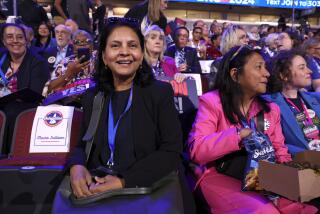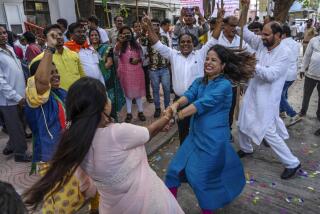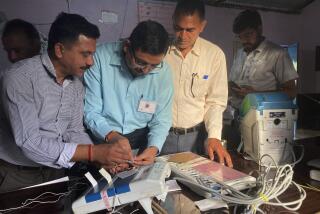Poor of Bombay Tired of Candidates’ Promises : India: Parliamentary balloting resumes today. Anger and apathy prevail among many of the voters.
- Share via
BOMBAY, India — On the eve of India’s return to the polls today in its most violent and cynical elections ever, Narmada Bai laughed at the trench that two workers were chopping ever so slowly through her flooded slum, a twisted and soggy sea of cracked and collapsing shanties in the heart of India’s wealthiest electorate.
“They only dig the hole. They never put anything in it,” she said Tuesday of the “power project” that politicians last month promised would, after a half-century wait, finally bring electricity to Geeta Nagar, a slum of 5,000 migrant laborers that is all but hidden in the back-alley shadows of Bombay’s modern skyscrapers and luxury apartments.
“Hah! This time, it’s light they promise. The last time, it was water. Oh, we got the water. It came four days before the vote. So, we voted for them. It lasted until the night the polls closed. Then it stopped, and we haven’t got water since.
“No, this time, we won’t be fooled. This time, I will not vote.”
Such is the political mood in much of South Bombay, a microcosmic urban maze of voters. It is renowned as the richest of India’s 545 parliamentary districts while simultaneously offering a split-screen view of the nation’s poorest of the poor: squatter slums where 60% of Bombay’s 11 million people now live, and increasingly, die.
And, as hundreds of millions of Indian voters again begin struggling their way to the polls for India’s delayed parliamentary elections today through torrentially lethal rains and blistering heat, there are few spots better than South Bombay to understand the anger and apathy prevailing in much of the most populous democracy on the globe.
Indeed, it wasn’t supposed to be this way, particularly in Bombay, where scores of men, women and children were crushed to death, drowned or electrocuted last weekend when India’s annual monsoon storm broke over the city--and where impoverished ghetto-dwellers such as Narmada Bai will now be expected to wade though polluted, waist-deep water to cast ballots in this final polling week.
The staggered balloting, which should have taken place here and throughout the rest of South India a month ago, was delayed after a suicide bomber assassinated former Prime Minister Rajiv Gandhi 1,000 miles south of here. Fearing the assassination would trigger a new round of chaos and add to election carnage that already had left 200 dead, election officials in New Delhi insisted that the democratic process is more important than the predictable heat and monsoon floods.
In truth, most of the politicians welcomed the break as a chance to regroup--particularly those in Gandhi’s Congress-I party. Despite the loss of its only national leader, the party is still banking on a sympathy wave to carry it to a victory most analysts said it could not have achieved even with Gandhi at its helm.
But the delay also exposed voters in southern and central India to the horrors that are India even in the best of times: the monsoon that has killed nearly 100 in the last few days and the brutal desert heat that has left nearly 200 more dead in the state of Rajasthan since last week.
And now, atop weeks of mind-numbing religious and political violence that has polarized the Indian nation as never before, many among the Indian electorate are, like Narmada Bai and her neighbors, fed up with a process once held sacred.
Even among South Bombay’s elite, who live, work and play along the magnificent, seafront mile called the Queen’s Necklace, there is, at the very least, a growing sense of bitterness and rejection of all whom they’ve tried before.
It is impossible to predict the outcome of these elections, with the best of India’s pollsters and analysts concluding that Gandhi’s assassination skewed all their political projections. Nor is it possible to identify a single district as typical of a nation of 840 million so massive and ethnically diverse it more often is called a subcontinent.
But there are few microcosms that better illustrate the vast and ever-widening gaps behind this painful national election than this district of South Bombay.
What is more, South Bombay lies in the heart of Maharashtra state, where the 48 parliamentary seats at stake this week are seen by most political pundits as pivotal in the race among four major national parties that hope to form the next national government. If Gandhi’s Congress-I is to storm back to power, it must do so here, particularly in districts such as South Bombay, which it has held for decades.
Here, as in so many of the 300 constituencies where voters will cast ballots today and Saturday to finish an exercise begun the day before Gandhi’s death on May 21, the contest is largely between two powerful, local candidates. One is a committed Hindu revivalist from the Bharatiya Janata Party, which has built a wave of burgeoning support on a platform of religious zeal and discipline. The other is a veteran leader of the Congress-I who was among Gandhi’s personal inner circle.
On the surface, the contest appears straightforward.
Representing Congress-I is Murli Deora, a shrewd and urbane Bombay political boss in the toughest and most traditional sense of the word.
Like most Congress-I candidates, Deora also has deliberately seasoned the campaign with a large dose of sympathy appeal. He has flooded his district with large posters displaying his portrait beside one of Gandhi, whose face appears in the center of a giant drop of blood.
“Vote for the party of martyrs, whose sacrifice for India shall never be forgotten,” the banners proclaim.
Deora’s opposition is a veteran Hindu revivalist and similarly long-serving local politician named Premkumar Sharma. The similarly savvy Sharma is not nearly as flamboyant as Deora. But, even according to Deora, he does not have to be.
“He cannot get even 20,000 votes in South Bombay on his own,” Deora said. “It’s the party that’s making him so strong. It’s Hinduism. It’s the temple.”
He was referring to what was, before the May 21 assassination, the key plank in the Hindu party’s campaign: a crusade by Hindu supremacists to remove a 500-year-old mosque and replace it with a temple to the Hindu demigod Lord Rama in the northeast Indian town of Ayodhya.
“And it’s more than the temple,” Deora added angrily during a recent lunch with three Western journalists. “In my constituency, these people are distributing trishuls (knives) in the name of protection of religion.
“They’re scaring people. This is my fourth parliamentary election in all, and I have never seen so blatant a use of religion and hatred like what I am seeing today.”
It is a message that Deora has screamed and plastered throughout the huge, 250,000-strong Muslim neighborhood in his district, which traditionally has voted as a bloc for Deora and his Congress-I. Now it is expected to split its vote--not only here but nationwide--among the socialist National Front of former Prime Minister Vishwanath Pratap Singh, India’s various Communist parties and other secular forces battling against each other, as well as the Bharatiya Janata Party.
But, even outside the Muslim strongholds, it is a message that no longer seems to work.
“The BJP is a party which I think even the Congress isn’t looking forward to facing right now,” said Manju Sanghi, an elegant and stately businesswoman who has just ended her term as president of the “ladies wing” of the Bombay Industrialists Chamber of Commerce.
Sanghi registered her comments as she and other “rich ladies of Bombay,” as Deora had billed the campaign event, assembled for an afternoon tea this week in the marbled, top-floor meeting room of the Podar House along Marine Drive. The meeting drew just a few dozen women. Some attributed the poor turnout to rainy weather. But others saw other forces at work.
“After the assassination of Rajiv Gandhi, you see, people are a little scared,” Sanghi said. “And, with the disintegration of the Congress Party, with so many leaders fighting each other for party leadership now, people have to be convinced that the Congress can deliver the goods.”
About eight floors down, and a mile or so up the coast, behind the glistening facades of buildings such as the Podar House along the Queen’s Necklace, in the heart of Geeta Nagar, they also know what they want this time around.
Water. And electricity. And food they can afford.
“We’ve got no light. We’ve got no water to drink. Prices are sky high. Why vote for Congress? Why vote for anyone?” said Sunanda Pawar, a retired domestic servant who, along with her fisherman husband, has raised three children on an income of just $50 a month since they moved into their Geeta Nagar hovel 12 years ago.
“Please, you tell us,” Sunanda’s husband, Gajanan, added after a visiting reporter asked the elderly couple whom they planned to vote for this week. “Please, you are wise. You tell us who will help us, and we will vote for him.
“Those who live in a place like this always will live in a place like this,” Sunanda Pawar continued.
“We have no way out. No education. No employment. So why vote?”
More to Read
Sign up for Essential California
The most important California stories and recommendations in your inbox every morning.
You may occasionally receive promotional content from the Los Angeles Times.










